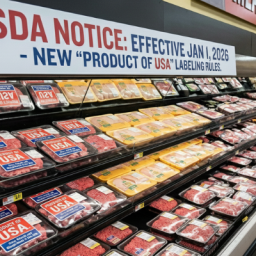
At midnight on October 1, 2025, funding expired for key federal agencies. The FDA and USDA’s FSIS are now operating with limited capacity. While essential inspections and recalls continue, many routine activities are delayed. For food, beverage, and consumer goods companies, this creates regulatory uncertainty and potential business risk.
How does the government shutdown affect FDA inspections and approvals
The FDA is functioning at a reduced capacity under its contingency plan. Roughly 77% of staff remain on duty because their work is tied to user fees or is legally deemed essential.
FDA activities that continue during the shutdown
- Outbreak investigations and emergency responses
- Oversight of recalls and market withdrawals
- Import screening of food and high-risk products
- Investigations of safety violations
- Surveillance of adverse events linked to drugs or devices
FDA activities that are delayed or suspended
- Routine plant inspections with no immediate risk
- Acceptance of new drug or device applications that require user fees (FDA cannot legally accept fees during a shutdown)
- Non-urgent premarket approvals and inspections of foreign facilities
- Development of new regulations, policies, and guidance documents
- Administrative functions, hiring, and training programs
Why this matters: Many businesses rely on FDA approvals to launch products, expand markets, or renew registrations. Even a short pause can create backlogs that last for months. When appropriations return, FDA is likely to increase inspections and enforcement to catch up, meaning companies that relaxed compliance during the shutdown could face penalties later.
What food safety functions continue at USDA FSIS during the shutdown
FSIS is responsible for meat, poultry, and egg product inspection. Because this work is considered critical to public health, most inspectors continue working.
FSIS functions that continue
- Daily on-site inspections in meat, poultry, and egg facilities
- Recalls and public health alerts
- Import checks on animal products
- Enforcement actions when food safety risks are identified
FSIS functions that may slow down
- Export certification for meat and poultry products
- Collection and publication of agricultural and trade data
- Research and policy development not tied to immediate safety
- Administrative support and routine oversight
Why this matters: Exporters could face certification delays, straining relationships with foreign buyers. At the same time, some state inspection programs may step in to fill gaps, but this creates inconsistency across jurisdictions.
What risks do food and beverage companies face during the shutdown
The shutdown creates compliance, operational, and reputational risks:
- Delayed inspections and certifications – Companies may not be able to move forward with product launches or maintain export schedules.
- Regulatory backlog – Even after funding resumes, FDA and FSIS face a queue of postponed work. This can affect timelines for months.
- Import slowdowns – FDA screening of imported food continues, but with fewer resources, shipments could face longer delays at ports. Perishable goods are especially vulnerable.
- Shift to state oversight – Some inspections may be delegated to state regulators, leading to inconsistent enforcement standards.
- Post-shutdown enforcement surge – Once fully funded, agencies often prioritize inspections and compliance reviews, exposing businesses that fell behind.
- International trade disruptions – Delays in USDA export certification can ripple across supply chains and weaken trade reliability.
What steps should companies take to stay compliant during the shutdown
- Strengthen internal compliance programs: With fewer federal inspections, your company becomes the first line of defense.
- Document all safety checks: Keep detailed records to show diligence in case of later audits.
- Plan for delays in product approvals: Adjust launch schedules and marketing plans to account for regulatory slowdowns.
- Monitor agency updates: Check FDA contingency plans and USDA shutdown notices for real-time updates.
- Prepare for import and export delays: Work closely with customs brokers and legal counsel to minimize disruption.
- Consult legal advisors early: Counsel can help identify risk exposure, particularly for labeling, recalls, and cross-border trade.
How Juris Law Group can help
At Juris Law Group, we advise food, beverage, and consumer goods companies on FDA and USDA compliance. Our attorneys have experience handling shutdown-related disruptions, import delays, and regulatory backlogs. Whether you need strategies for protecting your supply chain or guidance on compliance gaps during reduced oversight, our team can help.
Need help navigating FDA or USDA regulatory slowdowns? Contact Juris Law Group for expert guidance.
FAQs
Will my facility still be inspected during the shutdown?
Yes, but only if there is a clear public health risk. Routine FDA inspections are postponed. FSIS continues daily inspections of meat, poultry, and egg plants because they are legally required for production to continue.
Can I file a new product application with FDA?
You may submit it, but FDA cannot accept new user fees during the shutdown. That means reviews for new drugs, devices, or biologics will not begin until funding resumes. Applications already under review may proceed if supported by carryover fees.
Are food recalls still happening during the shutdown?
Yes. Both FDA and FSIS prioritize recalls and public health alerts, even during a shutdown. Oversight of unsafe products continues, although follow-up investigations may take longer. For real-time updates, visit our Food Recall Tracker Tool.
How are food imports handled when FDA is understaffed?
FDA continues to screen imports at ports of entry. However, with fewer staff, companies should anticipate slower clearance, especially for products flagged for additional review. Importers should plan for extra hold times and consider backup plans for perishable shipments.
Will USDA still issue export certifications?
Some certifications may continue, but staffing shortages can delay approvals. Exporters should work with legal and logistics teams to anticipate and communicate delays to trading partners. This risk is particularly significant for companies with international contracts tied to strict delivery deadlines.
What happens when the shutdown ends
Agencies typically experience a surge of enforcement activity. FDA and FSIS often prioritize catching up on inspections, reviewing pending applications, and issuing delayed guidance. Businesses that let compliance standards slip during the shutdown may face penalties once oversight ramps up again. Being proactive now can reduce that liability later.
Key takeaway
The 2025 government shutdown is not a full stop for FDA and FSIS, but it is a slowdown with real business consequences. Food companies should not assume regulators will catch every issue. Instead, strengthen internal systems, prepare for regulatory backlogs, and anticipate stricter enforcement once agencies return to full capacity.















